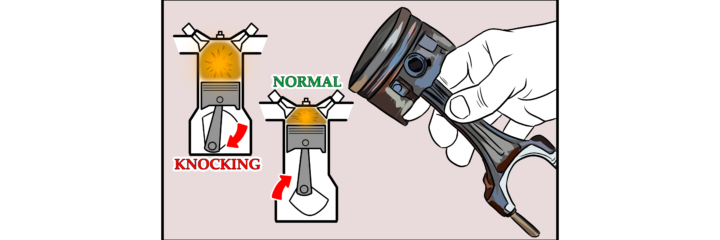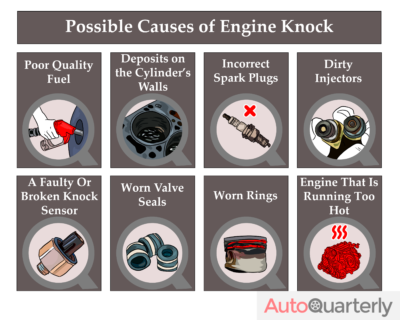Every driver knows the worry of hearing strange noises from inside their engine. If you’ve ever asked what the knocking sound in your engine could be, you certainly aren’t alone. Engine knock is a common problem, but it can have several causes. It also has a number of different names. For example, it’s sometimes known as “detonation.” To make matters more confusing, engine knock can sound different depending on the cause. Here, we take a closer look at what causes strange noises to occur inside your engine and how to fix engine knock so you can enjoy trouble-free driving once more.
- What Are the Possible Causes of Engine Knock?
- Poor Quality Fuel
- Deposits on the Cylinder’s Walls
- Incorrect Spark Plugs
- Possible Other Culprits
- Can Engine Knock Be Fixed?
- What Happens If I Don’t Get My Engine Knock Problem Fixed?
- Using a High-Quality Fuel
- Decrease Your Compression Ratio
- Check Your Spark Plugs
What Are the Possible Causes of Engine Knock?
Ideally, your car’s fuel should evenly burn in waves timed to match the engine cycles, carrying on through until the following cycle results in another wave. If the fuel isn’t properly ignited, though, it results in an explosion like a fireball that may interfere with the engine cycles and that could even cause damage to the engine’s components. Here, we take a look at some of the main reasons for engine knock occurring.
Poor Quality Fuel
A common cause of engine knock is poor quality fuel. Fuel which is low octane and low quality can result in many different issues, like increased temperatures in the combustion chamber, or high cylinder pressures. The octane rating of a fuel tells the driver the amount of compression that the gasoline is capable of tolerating – a higher rating means that the fuel is more resistant to combustion. This is the reason why high-pressure, more complex engines need more costly fuel.
Poor quality fuel may cause pre-ignition – where the fuel burns too early inside the engine. There are two different ways in which gasoline may ignite inside the combustion chamber of the engine. It may ignite from the spark plug or it may ignite from the wrong compression ratio. The balance is extremely delicate with any factor having the potential to skew the process. If the compression of the engine is too low, the fuel may combust and burn before the spark plug has time to ignite it. If the fuel ends up burning this way it will burn incompletely with the leftover fuel compounds and components causing debris that will stick onto the chamber’s interior. The build-up will negatively affect the environment inside the cylinders, and this can result in engine knock.
Deposits on the Cylinder’s Walls
Using poor quality fuel can cause deposits to form on the cylinder’s walls and this causes larger problems. Once these deposits begin to build up, they usually accumulate, taking up vital room that’s required to allow the engine to function normally and to mix fuel and air. If you imagine blood vessels being clogged up with cholesterol deposits you’ll get a good idea of the kind of issues that can arise. The larger the clog, the more restricted the blood flow becomes and the less the blood can make it through the blood vessel. A similar situation arises inside your car’s engine cylinder. Large deposits increase the compression inside the cylinder. If the higher compression can’t be accounted for by using a high octane gasoline or adjusting the temperature ranges of the engine, the result can be engine knock.
Incorrect Spark Plugs
A surprising number of people use the wrong kind of spark plugs for their vehicles. Often, people fail to understand the recommendations of their manufacturer or sometimes, they deliberately buy the wrong spark plugs in an attempt to save money. This is a bad idea, since, as spark plugs are vital for controlling the internal environment of the engine and need to operate in very precise conditions. If you choose the wrong spark plugs for your car, sub-par conditions are created for burning gasoline and this can lead to deposit buildup inside the combustion chamber and incorrect running temperatures – two key catalysts that can trigger engine knock.
Possible Other Culprits
There are a few other causes that are also related closely to the above three common culprits. They include:
- Dirty injectors
- A faulty or broken knock sensor
- Worn valve seals
- Worn rings
- An engine that is running too hot
Can Engine Knock Be Fixed?
As you can see, there are a number of potential causes of engine knock, so it can be hard to know how to fix the problem. Each engine knock cause has its own individual cure, and while most are quite simple, there’s no guarantee that trying it will make the engine knock disappear. It can be all-too-easy to misdiagnose the engine knock’s cause and there may even be multiple causes, so visiting a mechanic is probably the best idea.
What Happens If I Don’t Get My Engine Knock Problem Fixed?
Some older vehicles are actually prone to the problem of engine knock and, regardless of which measures you take, their engine may carry on knocking. The good news is that if you have an old car that has a persistent engine knock issue, the chances are that it won’t be an immediate problem. However, if the knock has only recently appeared or if you simply cannot bear the noise, you should certainly seek out the cause of the problem and find a way to rectify it. If left unresolved, engine knocking could end up causing major damage to the engine piston and cylinder wall of your vehicle. This damage can be very expensive to repair if you allow it to get out of hand, so determining why your engine is making unusual noises straight away is always the best course of action if you want to avoid your car being off the road for some time and your bank balance taking a major hit for repairs.
Luckily, there are several things that you can try to resolve the problem of engine knock yourself. Below, we’ll help you learn how to fix engine knock in your own garage.
Using a High-Quality Fuel
The first thing to try is to use higher quality gasoline. Ensure that you’re choosing fuel that has an octane rating that is in accordance with the recommendations of your car’s manufacturer. You will find this information inside your user manual. It may even be displayed on a sticker close to the gas cap. Although most American cars are fine with regular 87 octane gasoline, if you have a high-performance vehicle, you’ll probably need fuel with a higher rating.
Your car may have bad or old gas that is causing the engine knock problem. You can try to resolve this by adding an additive that boosts the octane level until you’ve gone through several fill-ups. Several different kinds of , like fuel injector cleaner that helps to clean not only injectors but dirty combustion chambers too. Try using the octane booster with three full refilled tanks at least before you evaluate the result. If neither of these tricks help, you could try switching brands of gasoline.
Decrease Your Compression Ratio
Another possible way to alleviate your engine knock causes is to decrease the compression ratio. Another key culprit can be dirty cylinders so you can try flushing them clean to resolve the knocking problem. With time, the components present in gasoline begin to build up. Over the months and years, small deposits begin to compound. Higher compression also tends to increase deposit formation too, exacerbating the issue exponentially.
It’s simpler to to your gasoline every so often (as per your manufacturer’s recommended schedule) to ensure the cylinders stay fairly clean than to try to adjust temperatures and compression to accommodate the existing deposits that will only get bigger over time.
Several kinds of detergent may be added to the fuel, like fuel injector cleaner that helps dirty combustion chambers and injectors alike. Again, run the additive through a minimum of three full fuel tanks before you evaluate the result.
Check Your Spark Plugs
Another trick that you can try at home is to check your car’s spark plugs. Once you’ve taken the spark plugs out of your engine, check their model numbers. The numbers that are stamped on the plugs should match the manufacturer’s recommended model of spark plugs in your user manual. If the numbers don’t match, you should buy the right type, fit them and see if the engine knock problem is resolved.
While this is relatively simple, some people just don’t have the appropriate tools or just feel uncomfortable fiddling around under the hood of their vehicle. If you don’t feel ready to tackle the job yourself, you should just take your car to a garage to have it inspected and repaired if necessary. Also, if the spark plugs do turn out the be a matching model number, you will still need to visit a mechanic since they are not the source of your engine knock problem and you will need the garage to determine the cause and resolve it on your behalf.



